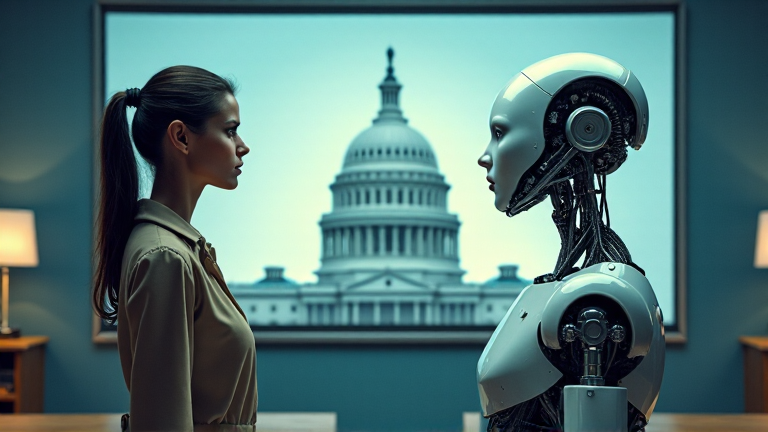
Resisting Automated Contempt: The Human Cost of AI in Education and Governance
In an era marked by a deepening political-technological crisis, a growing number of observers have expressed concern over a future where automated systems replace genuine human connection and expertise. Critics argue that what is emerging is not a benevolent revolution, but an unsettling transformation that reduces complex human engagements—especially in education and public service—to algorithmic transactions.
The Illusion of Automated Empathy
Many warn that entrusting care and insightful decision-making to machines risks creating a hollow world. While modern predictive models can mimic the cadence of human speech, they fall drastically short of offering genuine compassion. Observers note that relying on technology for empathy fosters not just inefficiency in real care, but also widespread societal exploitation, leading to a future characterized by automated emptiness.
A Century-Long Experiment with Teaching Machines
The ambition to replace teachers with technology is not a novel idea. Historical accounts trace this effort back to 1924, when Sidney Pressey introduced the first teaching machine. For a full century, entrepreneurial and technological communities have touted the promise of faster, cheaper, and more personalized education, all under the banner of science and innovation.
However, these promises have always overlooked a crucial point: true educational quality lies beyond test scores and efficiency metrics. The arguments from some Silicon Valley figures often mirror those of past proponents—pushing an agenda that not only devalues the art of teaching but also endangers the livelihoods of educators. At the K-12 level, where the majority of teaching professionals are women, and at higher education levels where diversity is more pronounced, the push for automation is seen by many as a dehumanizing assault on educational values.
Politically Charged Acts and the Erosion of Public Service
Recent administrative actions have intensified these concerns. Decisions to fire thousands of federal employees, purge critical government data, and slash funding—in many cases targeting civil rights programs—have left public institutions reeling. Commentators recall past observations that cruelty is often the intent behind such measures. For example, statements from officials in charge of significant reforms have explicitly mentioned creating an atmosphere of trauma among bureaucrats.
What many see is a deliberate attempt not only to restructure governance through technology but to undermine the vital public services that have historically upheld democratic values.
AI as a Political Technology and the Risks of Mechanistic Education
Some experts, like Dan McQuillan, argue that AI is inherently a political technology. Its material existence and social effects tend to amplify existing inequalities and perpetuate divisions—potentially steering society toward an era of algorithmic authoritarianism. While interesting AI research continues to offer insights, especially into language models and world models, skeptics claim that the overarching narrative misses the bigger picture: education is not merely a series of tasks to be automated.
This perspective has gained urgency amid current political climates where technological innovations are being celebrated by some while simultaneously being used to dismantle essential public services. As public institutions suffer and communities face intentional harm, critics urge decision-makers to "read the room" and reconsider the consequences of undermining human expertise in favor of managerial efficiency.
Voices of Resistance and Silent Heroes
Several influential voices have joined this debate, calling for a reassessment of the role of technology in society. From critiques on efficiency to warnings about the risks of blindly entrusting algorithms to replace human judgment, these narratives offer a counterpoint to the prevailing enthusiasm of tech oligarchs. One poignant anecdote recounted an analogy about two barbers—a story now retold with a twist: the innovation now calls for replacing the second barber with a skilled hairstylist, symbolizing the essential, yet undervalued, contribution of women in rebuilding and healing society.
This metaphor encapsulates the belief that when societal structures are disrupted, it is often the unrecognized, under-compensated labor—primarily carried out by women—that steps in to restore balance and nurture communities back to health.
The Broader Implications of the AI Age
Amid the discussions on AI, a doctrinal note from the Vatican titled Antiqua et nova has stirred intellectual curiosity. The document, rich with historical insights and reflective commentary, challenges its readers to consider not only the practical applications of AI in education but also profound theological questions about the nature of authority and the potential of technology to redefine fundamental human relationships.
In summary, as the world witnesses the convergence of technological revolution and political turmoil, there is an emerging consensus among critics: the drive to automate human roles in education and governance risks devaluing the deeply human traits of creativity, empathy, and moral judgment. The future, many argue, will be determined by those who recognize and defend the irreplaceable qualities of human labor and expertise.
Note: This publication was rewritten using AI. The content was based on the original source linked above.